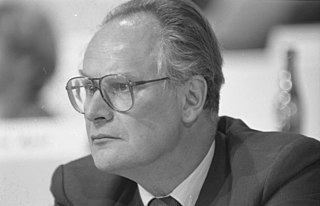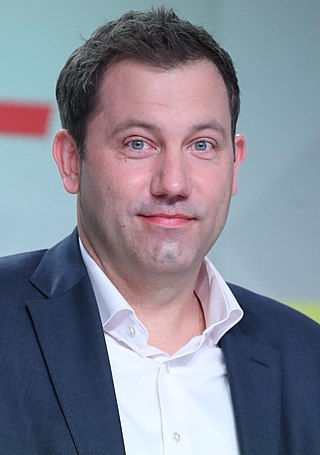
Bavaria, officially the Free State of Bavaria, is a state in the southeast of Germany. With an area of 70,550.19 km2 (27,239.58 sq mi), it is the largest German state by land area, comprising roughly a fifth of the total land area of Germany, and with over 13.08 million inhabitants, it is the second most populous German state, behind only North Rhine-Westphalia; however, due to its large land area, its population density is below the German average. Major cities include Munich, Nuremberg, and Augsburg.

Franconia is a region of Germany, characterised by its culture and East Franconian dialect. Franconia is made up of the three Regierungsbezirke of Lower, Middle and Upper Franconia in Bavaria, the adjacent, Franconian-speaking South Thuringia, south of the Thuringian Forest—which constitutes the language boundary between Franconian and Thuringian—and the eastern parts of Heilbronn-Franconia in Baden-Württemberg.

Wilhelm Johann Harald Hoegner was the second Bavarian minister-president after World War II, and the father of the Bavarian constitution. He has been the only Social Democrat to hold this office since 1920.

The Communist Party of Germany was a major far-left political party in the Weimar Republic during the interwar period, an underground resistance movement in Nazi Germany, and a minor party in West Germany during the postwar period until it was banned by the Federal Constitutional Court in 1956.

The Landtag of Bavaria, officially known in English as the Bavarian State Parliament, is the unicameral legislature of the German state of Bavaria. The parliament meets in the Maximilianeum in Munich.

Peter Glotz was a German social democratic politician and social scientist.

Dr. Ulrich Maly is a German politician, a member of the Social Democratic Party of Germany who served as Mayor of Nuremberg from 2002 till 2020.

CDU/CSU, unofficially the Union parties or the Union, is a centre-right Christian democratic and conservative political alliance of two political parties in Germany: the Christian Democratic Union of Germany (CDU) and the Christian Social Union in Bavaria (CSU).

Annemarie Renger was a German politician for the Social Democratic Party of Germany (SPD).

An indirect presidential election was held in Germany on 30 June 2010 following the resignation of Horst Köhler as president of Germany on 31 May 2010. Christian Wulff, the candidate nominated by the three governing parties, the Christian Democratic Union, the Christian Social Union of Bavaria and the Free Democratic Party, was elected president in the third ballot. His main contender was the candidate of two opposition parties, the Social Democratic Party and the Alliance '90/The Greens, independent human rights activist Joachim Gauck.

The Free State of Coburg emerged from the Duchy of Saxe-Coburg and Gotha at the end of the First World War. It existed from November 1918 until its union with the Free State of Bavaria on 1 July 1920.

The second Stresemann cabinet, headed by Chancellor Gustav Stresemann of the German People's Party (DVP), was the ninth democratically elected government of the Weimar Republic. It took office on 6 October 1923 when it replaced the first Stresemann cabinet, which had resigned on 3 October over internal disagreements related to increasing working hours in vital industries above the eight-hour per day norm. The new cabinet was a majority coalition of four parties from the moderate left to centre-right.

Markus Thomas Theodor Söder is a German politician serving as Minister-President of Bavaria since 2018 and leader of the Christian Social Union in Bavaria (CSU) since 2019.
The Free Voters of Bavaria is a conservative political party in Bavaria, considered centrist or centre-right. It has served as part of the governing coalition there since the 2018 state election under the leading Christian Social Union. The term "Free Voters" is also applied to the various independent voter groups common in Bavarian municipal and district elections. The name Free Voters of Bavaria applies to both the Bavarian State Association of Free and Independent Voters, an umbrella organization of Free Voter groups, as well as the Bavarian state chapter of the nationwide party Free Voters. The two groups exist simultaneously under the same name due to Bavarian election law not allowing umbrella organizations to run for office, thus the state party Free Voters of Bavaria was founded in 1997 in order to participate in the Bavarian state elections.

Lars Klingbeil is a German politician of the Social Democratic Party who has been serving as the party's Co-Leader since 2021, together with Saskia Esken.

Florian Pronold is a German lawyer and politician of the SPD who served as a member of the German Bundestag from 2002 until 2021. From 11 July 2009 to 20 May 2017, he was state chairman of the SPD Bavaria.

Katja Hessel is a German lawyer and politician of the Free Democratic Party (FDP) who has been serving as a member of the Bundestag from the state of Bavaria since 2017.

Uli Grötsch is a German politician of the Social Democratic Party (SPD) who has been serving as the German Bundestag's Federal Police Commissioner since 2024. He previously was as a member of the Bundestag from the state of Bavaria from 2013 to 2024. Grötsch has been police officer within the Bavarian State Police for 21 years.

Carsten Träger is a German politician of the Social Democratic Party (SPD) who has served as a member of the Bundestag from the state of Bavaria since 2013.

The 2023 Bavarian state election was held on 8 October 2023 to elect the members of the 19th Landtag of Bavaria. The outgoing government was a coalition of the Christian Social Union in Bavaria (CSU) and the Free Voters of Bavaria (FW) led by Minister-President of Bavaria Markus Söder. The 2023 Hessian state election was held the same day.




















